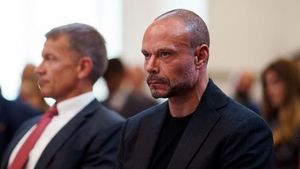In a shocking revelation, the Number 4 court of Ávila is investigating allegations of bribery involving officials at the women's prison of Brieva, where Ana Julia Quezada, convicted of murdering eight-year-old Gabriel Cruz, is serving her sentence. The investigation has been ongoing for nearly a year, following claims that some prison staff engaged in sexual relations with Quezada in exchange for providing her with a mobile phone.
Quezada, who was sentenced to permanent revisable prison for the heinous crime in February 2018, allegedly used the phone to record intimate encounters with prison officials and a cook, which she then purportedly used to blackmail the prison administration in an attempt to secure a transfer to a facility in Barcelona. According to reports from El País, testimonies from a prison educator, three inmates, and Quezada's current partner corroborate the claims of sexual relations and coercive tactics.
In a detailed report, Laura Pérez, the prison director, acknowledged that she had received information about Quezada's activities through an educator. The report stated, “The inmate claims to have a mobile phone containing recordings, including videos of the official in her cell.” The implicated official was arrested on September 4, 2024, for alleged abuse of public function.
Adding to the gravity of the situation, Quezada has claimed that she was a victim of rape during her interactions with the official, stating that he exploited his position of power over her. This allegation has raised further concerns about the treatment of inmates within the prison system.
On March 6, 2025, the court expanded its investigation to include potential disciplinary actions against Quezada and the prison cook, who is also accused of facilitating sexual favors. This has led to heightened scrutiny of the prison environment, where it is alleged that sexual encounters occurred at night in Quezada's cell.
The investigation was sparked by a public complaint from Patricia Ramírez, Gabriel's mother, who revealed on May 11, 2024, that Quezada was allegedly using a mobile phone in prison to conduct interviews with journalists and a production company interested in creating a documentary about her son's murder. Ramírez had previously alerted the Ministry of the Interior about these claims in December 2023 but received no response.
Frustrated by the lack of action, Ramírez took her concerns to the Senate on June 11, 2024, where she expressed her feelings of helplessness as a victim of a violent crime. She sought to halt the production of the documentary, fearing that it would exploit her family's tragedy. Ramírez has since become a vocal advocate against media exploitation of crime victims, emphasizing the need for regulatory measures to protect families from further harm.
In a recent statement, Ramírez indicated that Quezada's partner, who is also incarcerated, has possession of the recordings made with the mobile phone, threatening to expose them and “sink the center and its management.” This blackmail extends the implications of Quezada's actions beyond mere personal gain, affecting the integrity of the entire prison system.
As the investigation unfolds, both Quezada and Ramírez have sought to be recognized as private accusers in the case. However, their requests have been denied by the judge, who ruled that they do not hold the status of victims in the bribery case being investigated.
In light of these developments, Ramírez has called a press conference for May 7, 2025, to publicly address what she describes as a situation of “abandonment and institutional and judicial neglect.” She plans to discuss the violations of rights within the framework of the Victim Statute and European regulations, as well as the potential irregularities occurring in the prison that could have impacted her family's moral integrity.
The case raises critical questions about the handling of high-profile inmates and the ethical responsibilities of prison officials. As more information comes to light, the implications for the prison system and the treatment of victims and their families remain to be seen.
It is evident that the revelations surrounding Ana Julia Quezada's time in prison have not only shocked the public but have also reignited discussions about the need for reform within the penal system.
As the investigation continues, the focus will undoubtedly remain on the accountability of those in power and the protection of victims' rights in the face of such disturbing allegations.






